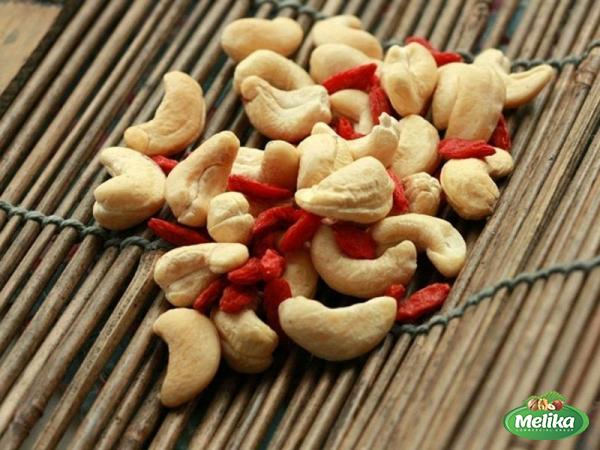The cashew nut industry is a thriving sector of the global economy, with cashews being one of the most widely consumed nuts in the world. Cashews are native to Northeastern Brazil but are now grown in many regions across the globe, including Africa, Asia, and the Americas. The industry encompasses various stages, from cultivation to processing and distribution, creating employment opportunities and contributing significantly to the economies of cashew-producing countries. Cashew cultivation involves a meticulous process that begins with land preparation and seed selection. Cashew trees are hardy and can grow in harsh climates, making them ideal for cultivation in both tropical and subtropical regions. The trees bear fruits known as cashew apples, which produce a single cashew nut encased in a hard shell. These nuts are harvested and processed to remove the outer shell, thereby revealing the cashew kernel. The cashew processing industry plays a crucial role in maximizing the value of cashews. Processing involves a series of steps, including grading, shelling, drying, and packaging. The grading process ensures that only high-quality nuts are selected for further processing, while shelling involves the removal of the cashew shell using specialized machinery. Drying is a critical step that reduces the moisture content in the kernels, ensuring their longevity and quality. Finally, the nuts are packaged and prepared for distribution to various markets. Cashews have gained popularity worldwide due to their nutritional benefits and versatility in cooking. They are a rich source of healthy fats, protein, fiber, vitamins, and minerals. Cashews are commonly consumed as a standalone snack, used in culinary preparations, or incorporated into various food products such as chocolates, cookies, and spreads.

nuts
 Moreover, cashew nuts are also used in the production of cashew milk, which serves as an alternative to cow’s milk for those with lactose intolerance or dietary preferences. The cashew nut industry is primarily dominated by several leading cashew-producing countries, including Vietnam, India, Ivory Coast, Nigeria, and Brazil. Vietnam is the largest exporter of cashews globally, with India being the largest consumer and processor. These countries have invested heavily in the development of their cashew industries, optimizing production processes, and creating employment opportunities for local communities. Despite its positive impact on economies and consumer demand, the cashew industry also faces various challenges. Climate change, pests, and diseases pose significant risks to cashew cultivation, affecting crop yield and quality. Additionally, fluctuations in market prices, competition from other nut varieties, and quality control issues can impact the profitability of cashew businesses. Poor infrastructure and limited access to financial resources in cashew-producing regions are further hindrances to industry growth. To overcome these challenges, industry stakeholders are adopting innovative solutions. Research and development initiatives are underway to develop cashew varieties resistant to pests and diseases and improve cultivation practices for higher yields. Governments and international organizations are providing support through capacity building, financing, and infrastructure development programs. Additionally, partnerships between private sector players, NGOs, and farmers’ cooperatives aim to improve value chains, promote sustainability, and enhance market access for cashew growers. The cashew nut industry has significant potential for growth and development. The increasing global demand for healthy and natural foods, coupled with the versatility of cashews, presents opportunities for expansion in both existing and new markets. Product diversification, such as the development of cashew-based snacks and confectioneries, can further drive market growth. Moreover, investments in technology and machinery for efficient processing and packaging can enhance productivity and improve product quality. In conclusion, the cashew nut industry is a vital component of the global economy, contributing to the livelihoods of millions of people worldwide. Cashews are highly valued for their taste, nutritional benefits, and culinary versatility. Despite the challenges faced by the industry, stakeholders are actively working towards sustainable solutions to ensure the continued growth and success of the cashew nut industry. With ongoing efforts in research, development, and market expansion, the cashew nut industry is poised for a promising future. The cashew nut industry has experienced remarkable growth over the years, driven by increasing consumer demand for healthy snack options and the versatile applications of cashews in various food products. This article explores the key aspects of the cashew nut industry, including cultivation, processing, market trends, and emerging business opportunities. 2. Cultivation and Harvesting Cashew cultivation is predominantly carried out in tropical and subtropical regions around the world.
Moreover, cashew nuts are also used in the production of cashew milk, which serves as an alternative to cow’s milk for those with lactose intolerance or dietary preferences. The cashew nut industry is primarily dominated by several leading cashew-producing countries, including Vietnam, India, Ivory Coast, Nigeria, and Brazil. Vietnam is the largest exporter of cashews globally, with India being the largest consumer and processor. These countries have invested heavily in the development of their cashew industries, optimizing production processes, and creating employment opportunities for local communities. Despite its positive impact on economies and consumer demand, the cashew industry also faces various challenges. Climate change, pests, and diseases pose significant risks to cashew cultivation, affecting crop yield and quality. Additionally, fluctuations in market prices, competition from other nut varieties, and quality control issues can impact the profitability of cashew businesses. Poor infrastructure and limited access to financial resources in cashew-producing regions are further hindrances to industry growth. To overcome these challenges, industry stakeholders are adopting innovative solutions. Research and development initiatives are underway to develop cashew varieties resistant to pests and diseases and improve cultivation practices for higher yields. Governments and international organizations are providing support through capacity building, financing, and infrastructure development programs. Additionally, partnerships between private sector players, NGOs, and farmers’ cooperatives aim to improve value chains, promote sustainability, and enhance market access for cashew growers. The cashew nut industry has significant potential for growth and development. The increasing global demand for healthy and natural foods, coupled with the versatility of cashews, presents opportunities for expansion in both existing and new markets. Product diversification, such as the development of cashew-based snacks and confectioneries, can further drive market growth. Moreover, investments in technology and machinery for efficient processing and packaging can enhance productivity and improve product quality. In conclusion, the cashew nut industry is a vital component of the global economy, contributing to the livelihoods of millions of people worldwide. Cashews are highly valued for their taste, nutritional benefits, and culinary versatility. Despite the challenges faced by the industry, stakeholders are actively working towards sustainable solutions to ensure the continued growth and success of the cashew nut industry. With ongoing efforts in research, development, and market expansion, the cashew nut industry is poised for a promising future. The cashew nut industry has experienced remarkable growth over the years, driven by increasing consumer demand for healthy snack options and the versatile applications of cashews in various food products. This article explores the key aspects of the cashew nut industry, including cultivation, processing, market trends, and emerging business opportunities. 2. Cultivation and Harvesting Cashew cultivation is predominantly carried out in tropical and subtropical regions around the world.
Specifications of nuts
 The process begins with land preparation, followed by selecting high-quality seeds for planting. Cashew trees are known for their adaptability to harsh climates and resilience to pests and diseases. The fruits, known as cashew apples, are harvested when they ripen, with each apple containing a single nut. 3. Processing and Value Addition Processing cashews involves several stages, starting with grading to select the best quality nuts for further processing. The nuts are then shelled using specialized machinery to remove the hard outer shell. After shelling, the kernels are dried to reduce moisture content, ensuring longer shelf life and preserving the nut’s flavor and nutritional qualities. Finally, the cashews are packaged and prepared for distribution locally or internationally. 4. Global Market Overview Vietnam is the largest exporter of cashew nuts, followed by countries like India, Ivory Coast, Nigeria, and Brazil. India, being the largest consumer and producer, has a well-established processing industry. The global market for cashew nuts has witnessed consistent growth, driven by rising health-consciousness among consumers and the popularity of plant-based diets. As a result, cashews are not only consumed as a snack but also incorporated into various food products and dishes. 5. Health and Nutritional Benefits Cashews are known for their rich nutritional profile. They are a great source of healthy fats, protein, dietary fiber, vitamins, and minerals such as copper, magnesium, and phosphorus. Cashews have been linked to several health benefits, including improved heart health, weight management, and better digestion. Moreover, they are suitable for individuals with dairy allergies and are frequently used as an alternative in plant-based milk products. 6. Challenges and Risks The cashew nut industry faces several challenges that impact its growth and profitability. Climate change poses risks to cultivation, as cashew trees require specific temperature and rainfall conditions for optimal growth. Pests and diseases, such as cashew nut root rot and cashew leaf spot, can significantly affect crop yield and quality. Fluctuating market prices, competition from other nuts, and limited infrastructure also pose challenges to growers and processors. 7. Sustainability and Social Impact Sustainability is a key focus for the cashew nut industry. Efforts are being made to adopt environmentally friendly farming practices, such as organic and regenerative agriculture, to minimize the use of chemical inputs. Several organizations and certifications promote fair trade practices and social responsibility within the industry, ensuring equitable benefits for farmers and workers. Investments in education, healthcare, and infrastructure support the social and economic development of cashew-growing communities.
The process begins with land preparation, followed by selecting high-quality seeds for planting. Cashew trees are known for their adaptability to harsh climates and resilience to pests and diseases. The fruits, known as cashew apples, are harvested when they ripen, with each apple containing a single nut. 3. Processing and Value Addition Processing cashews involves several stages, starting with grading to select the best quality nuts for further processing. The nuts are then shelled using specialized machinery to remove the hard outer shell. After shelling, the kernels are dried to reduce moisture content, ensuring longer shelf life and preserving the nut’s flavor and nutritional qualities. Finally, the cashews are packaged and prepared for distribution locally or internationally. 4. Global Market Overview Vietnam is the largest exporter of cashew nuts, followed by countries like India, Ivory Coast, Nigeria, and Brazil. India, being the largest consumer and producer, has a well-established processing industry. The global market for cashew nuts has witnessed consistent growth, driven by rising health-consciousness among consumers and the popularity of plant-based diets. As a result, cashews are not only consumed as a snack but also incorporated into various food products and dishes. 5. Health and Nutritional Benefits Cashews are known for their rich nutritional profile. They are a great source of healthy fats, protein, dietary fiber, vitamins, and minerals such as copper, magnesium, and phosphorus. Cashews have been linked to several health benefits, including improved heart health, weight management, and better digestion. Moreover, they are suitable for individuals with dairy allergies and are frequently used as an alternative in plant-based milk products. 6. Challenges and Risks The cashew nut industry faces several challenges that impact its growth and profitability. Climate change poses risks to cultivation, as cashew trees require specific temperature and rainfall conditions for optimal growth. Pests and diseases, such as cashew nut root rot and cashew leaf spot, can significantly affect crop yield and quality. Fluctuating market prices, competition from other nuts, and limited infrastructure also pose challenges to growers and processors. 7. Sustainability and Social Impact Sustainability is a key focus for the cashew nut industry. Efforts are being made to adopt environmentally friendly farming practices, such as organic and regenerative agriculture, to minimize the use of chemical inputs. Several organizations and certifications promote fair trade practices and social responsibility within the industry, ensuring equitable benefits for farmers and workers. Investments in education, healthcare, and infrastructure support the social and economic development of cashew-growing communities.
buy nuts
 8. Emerging Business Opportunities The cashew nut industry presents several emerging business opportunities for entrepreneurs and investors. Firstly, there is room for innovation and product diversification, such as the development of flavored cashew snacks, roasted cashews with unique seasonings, and cashew-based energy bars. Secondly, organic and sustainably sourced cashews are gaining popularity, providing a niche market for producers committed to eco-friendly practices. Additionally, there is potential for value-added products like cashew butter, cashew flour, and cashew milk. 9. Technological Advancements Advancements in technology play a crucial role in enhancing the efficiency and quality of cashew processing. Automated machinery for grading, shelling, and drying improves productivity while ensuring consistent product standards. Furthermore, new packaging techniques help preserve the freshness and extend the shelf life of cashew products, ensuring they reach consumers in optimal condition. 10. Market Expansion and International Trade The global demand for cashew nuts continues to grow, presenting opportunities for market expansion and international trade. Export-oriented countries are exploring new markets in developed and emerging economies, creating trade partnerships and establishing supply chains. Additionally, the rise of e-commerce platforms provides a direct avenue for cashew growers and processors to reach consumers globally. 11. Collaboration and Industry Initiatives Collaboration between industry stakeholders, governments, and international organizations is vital for the sustainable development of the cashew nut industry. Knowledge sharing, capacity building, and training programs support farmers and processors in adopting best practices and improving efficiency. Investments in research and development foster innovation and help address challenges related to crop productivity, disease management, and value addition. 12. Conclusion The cashew nut industry is poised for continued growth, driven by increasing consumer demand for healthy and natural food products. Cashews offer not only a delicious snack but also a multitude of culinary possibilities and nutritional benefits. With the right investments in technology, sustainability, and market expansion, the cashew nut industry can unlock new business opportunities while uplifting the livelihoods of cashew growers and contributing to the economic development of cashew-producing countries.
8. Emerging Business Opportunities The cashew nut industry presents several emerging business opportunities for entrepreneurs and investors. Firstly, there is room for innovation and product diversification, such as the development of flavored cashew snacks, roasted cashews with unique seasonings, and cashew-based energy bars. Secondly, organic and sustainably sourced cashews are gaining popularity, providing a niche market for producers committed to eco-friendly practices. Additionally, there is potential for value-added products like cashew butter, cashew flour, and cashew milk. 9. Technological Advancements Advancements in technology play a crucial role in enhancing the efficiency and quality of cashew processing. Automated machinery for grading, shelling, and drying improves productivity while ensuring consistent product standards. Furthermore, new packaging techniques help preserve the freshness and extend the shelf life of cashew products, ensuring they reach consumers in optimal condition. 10. Market Expansion and International Trade The global demand for cashew nuts continues to grow, presenting opportunities for market expansion and international trade. Export-oriented countries are exploring new markets in developed and emerging economies, creating trade partnerships and establishing supply chains. Additionally, the rise of e-commerce platforms provides a direct avenue for cashew growers and processors to reach consumers globally. 11. Collaboration and Industry Initiatives Collaboration between industry stakeholders, governments, and international organizations is vital for the sustainable development of the cashew nut industry. Knowledge sharing, capacity building, and training programs support farmers and processors in adopting best practices and improving efficiency. Investments in research and development foster innovation and help address challenges related to crop productivity, disease management, and value addition. 12. Conclusion The cashew nut industry is poised for continued growth, driven by increasing consumer demand for healthy and natural food products. Cashews offer not only a delicious snack but also a multitude of culinary possibilities and nutritional benefits. With the right investments in technology, sustainability, and market expansion, the cashew nut industry can unlock new business opportunities while uplifting the livelihoods of cashew growers and contributing to the economic development of cashew-producing countries.











Your comment submitted.